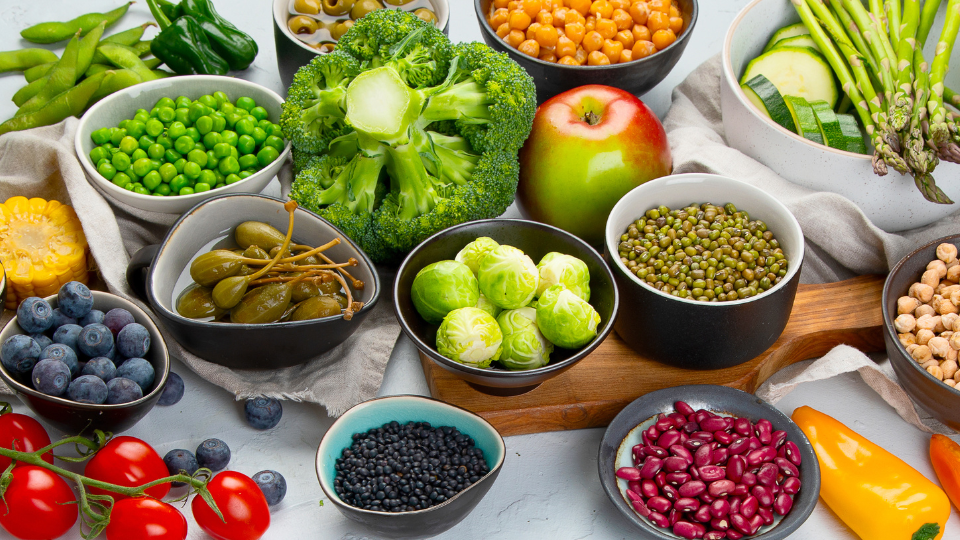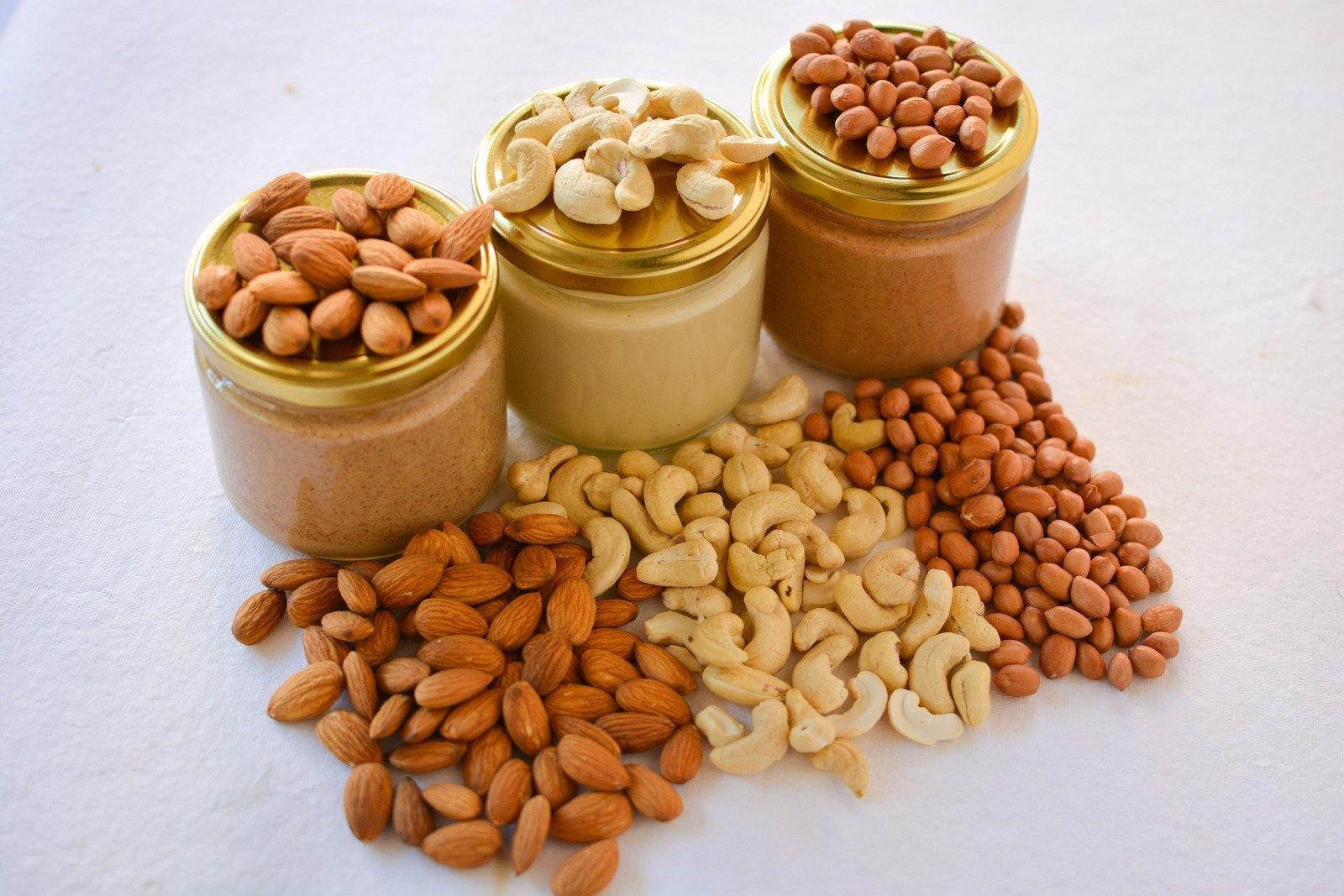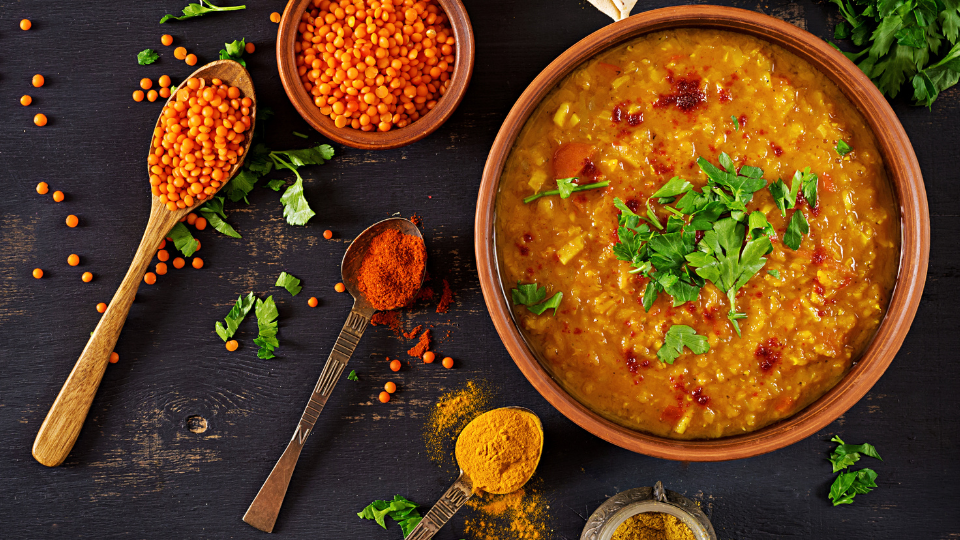Are you looking to embrace a healthier lifestyle and incorporate more plant-based meals into your diet? Cooking a plant-based diet at home is not only beneficial for your health but also for the environment.
By choosing to eat more fruits, vegetables, whole grains, and legumes, you can improve your overall well-being while reducing your carbon footprint.
In this article, we will guide you on how to cook a plant-based diet at home with ease and confidence. We'll explore the basics of whole food plant-based cooking, including essential kitchen must-haves, simple tweaks to make everyday Indian food plant-based, and even introduce you to new delicious healthy vegan recipes.
You'll also learn about Dr. Greger's Daily Dozen - a comprehensive guide to ensure you get all the necessary nutrients through a whole food plant-based diet.
So whether you're already following a plant-based lifestyle or just starting out on this journey, this article will provide you with the knowledge and practical tips needed to create nourishing and flavorful meals in the comfort of your own kitchen.
Key Takeaways
- Incorporate a variety of plant-based ingredients such as seeds, beans, grains, tofu, and avocado into your meals.
- Avoid animal products, excessive sugar, and high-fat additives in order to create nourishing and flavorful plant-based dishes.
- Utilize cooking techniques such as roasting vegetables without oil, steaming vegetables to preserve nutrients, and exploring oil-free cooking for enhanced flavors and ingredient variety.
- Explore plant-based dairy alternatives and meat alternatives, which are lower in saturated fat and have a reduced environmental impact, for use in various dishes.
What is a whole food plant-based diet?
If you're looking to adopt a whole food plant-based diet and cook plant-based meals at home, there are certain ingredients that you'll want to incorporate and others that you'll want to avoid.
To ensure a wholesome and nutritious meal, focus on using ingredients like fruits, vegetables, whole grains, legumes, nuts, and seeds. Avoid processed foods, refined sugars, oils, and animal products, as they can be detrimental to your health.
By following these guidelines and experimenting with different recipes and flavors, you can create delicious plant-based meals that nourish your body.
Ingredients to use
When cooking a plant-based diet at home, it's essential to use an abundance of fresh and vibrant ingredients that will make your taste buds happy. Incorporating various plant-based foods into your meals ensures that you get the necessary nutrients for optimal health.
Here are four key ingredients to include in your plant-based recipes:
-
Seeds: Add a sprinkle of seeds, such as chia or flaxseeds, to your dishes for an extra boost of omega-3 fatty acids and fiber. These tiny powerhouses provide texture and nutty flavors while enhancing the nutritional value of your meals.
-
Lentils/legumes/pulses: Whether it's chickpeas, black beans, soy beans or lentils, legumes are a fantastic source of protein and fiber in a plant-based diet. They are versatile and add heartiness and depth to soups, stews, salads or even homemade veggie burgers.
-
Grains: Whole grains like brown rice, whole wheat and oats are staples in a plant-based kitchen. They offer essential nutrients like B vitamins and minerals while providing satiety. Experiment with different grains to keep your meals interesting and diverse.
-
Tofu: Tofu is an excellent substitute for paneer and meat in many recipes due to its high protein content and ability to absorb flavors well. Whether marinated and grilled or blended into creamy sauces, tofu adds texture and substance to stir-fries, curries, or sandwiches.
By incorporating these ingredients into your plant-based cooking repertoire, you'll create delicious dishes that nourish both body and soul while satisfying even the most discerning taste buds.
Ingredients to avoid
When cooking a plant-based diet at home, avoiding certain ingredients that may not align with your dietary goals is essential.
Animal Products
First on the list are animal products such as meat, dairy, and eggs. These ingredients not only go against the principles of a plant-based diet but also have been found to increase your risk of chronic lifestyle disease. Instead, opt for plant-based protein sources, such as chickpeas, black beans, lentils, soy beans and soy products like soy milk, tofu, tempeh and edamame, which are rich in fiber and essential nutrients.
Sugar
Another ingredient to avoid is sugar. While it may be tempting to add a bit of sweetness to your dishes, excess sugar intake can lead to various health issues, such as weight gain and diabetes. Instead of relying on refined sugars, try incorporating natural sweeteners like date syrup, date sugar, stevia, black molasses, fresh fruits and dry fruits. Additionally, watch out for processed foods that often contain hidden sugars.
Oil
Lastly, limit the use of high-fat ingredients such as oils when preparing plant-based meals. Instead of frying or sautéing with oil, consider using vegetable broth or water or nut butters as a healthier alternative. This will help reduce unnecessary calories and disease risk while still adding flavor to your dishes.
Remember to experiment with different herbs and spices like garlic and peppers to enhance the flavors of vegetables like potatoes and sweet potatoes to create well-rounded dishes that satisfy both your taste buds and nutritional needs.
Plant-Based cooking - Kitchen Must Haves
To cook a plant-based diet at home, there are a few essential items you should have in your kitchen:
- Stock up on local and seasonal fruits, veggies, and greens to ensure freshness and maximize nutritional value.
- Whole grains like unpolished brown rice, red rice, oats, quinoa, millets, and whole wheat are essential for a balanced plant-based meal.
- Make sure to have dairy replacements such as nut butters, curds, and tofu as well as lentils, pulses, legumes for protein sources.
Also, don't forget other handy condiments to enhance the flavors of your dishes!
Local & seasonal fruits, veggies and greens
One great way to incorporate more local and seasonal fruits, veggies, and greens into your plant-based diet is by exploring the vibrant offerings at your nearby farmer's market. Not only
will you support local farmers and businesses, but you'll also have access to a wide variety of fresh and nutritious produce.
Here are four reasons why shopping at the farmer's market can enhance your plant-based cooking:
-
Freshness: The fruits, veggies, and greens available at the farmer's market are often harvested just hours before being sold. This means they retain their nutrients and flavors better than those in traditional grocery stores.
-
Quality: Local farmers take pride in growing high-quality produce without the use of harmful pesticides or synthetic fertilizers. By choosing these organic options, you can ensure that you're consuming wholesome and pesticide-free foods.
-
Variety: Farmer's markets offer an abundance of seasonal produce that may not be readily available in supermarkets. From heirloom tomatoes to exotic mushrooms, you'll find a range of unique ingredients to experiment with in your plant-based recipes.
-
Inspiration: Exploring the colorful displays of fruits and vegetables at the farmer's market can ignite your creativity in the kitchen. The sight of vibrant leafy greens or juicy berries may inspire you to whip up a refreshing salad, blend them into a delicious smoothie, or even create a flavorful sauce for your favorite plant-based dishes.
By incorporating locally sourced ingredients into your plant-based options, like soups or sauces served over brown rice or leafy greens, you support sustainable farming practices and enjoy meals packed with flavor and nutrition.
Whole grains - Unpolished rice, millets, whole wheat
When you're at the farmer's market, take advantage of the wide variety of whole grains like unpolished rice, millet, and whole wheat - they are not only delicious but also packed with nutrients that can help improve your overall health.
Unpolished rice
Whole grains are essential to a plant-based diet as they provide fiber, vitamins, minerals, and antioxidants. Unpolished rice or brown rice is an excellent option as it retains its bran and germ layers which are rich in fiber and nutrients. It has a slightly nutty flavor and a chewy texture that adds depth to your dishes.
Millets
Millets are gluten-free grains that come in different varieties, such as sorghum, pearl millet, and finger millet. They are high in protein and fiber while being low in fat. These versatile grains can be used in salads, porridge, or even ground into flour for baking bread or making dosas and pancakes.
You can also check out Sampoorna Ahara's Gluten-free millet and almond bread, to add more millets to your daily diet
Whole wheat
Whole wheat is another fantastic choice for incorporating whole grains into your plant-based meals. It contains all parts of the grain, including the bran, germ, and endosperm, which provide essential nutrients like B vitamins, iron, magnesium, and fiber.
Whole wheat products like roti or bread have a higher nutritional value compared to their refined counterparts because they retain all these essential components. You can enjoy whole wheat rotis with fresh vegetables for a quick and satisfying meal or make sandwiches using whole wheat bread filled with colorful veggies for added nutrition.
At Sampoorna Ahara, we have a wide range of whole wheat products and recipes just for you!
Overall, by adding these nutritious whole grains to your plant-based diet at home, you not only enhance the taste of your meals but also boost their nutritional value for better overall health.
Dairy replacements - Nut butters, curds & tofu
Liven up your meals and explore dairy replacements like nut butters, curds, and tofu - they offer a range of flavors and textures that can elevate your plant-based dishes to new heights. Dairy replacements are a great way to add creaminess, tanginess, and protein to your meals without relying on animal products.
Nut Butters
Nut butters, such as almond butter or peanut butter, are not only delicious but also packed with healthy fats and nutrients. Spread them on toast or use them as a base for sauces and dressings to add richness to your dishes.
Curds
Curds made from plant-based ingredients like soy or almond milk can be used in place of traditional yogurt or sour cream. They provide a tangy flavor that pairs well with savory dishes like tacos or salads. You can also enjoy curds as a standalone snack or mix them with fruits for a refreshing dessert option. With that being said, make sure to try our soy almond curd!
Tofu
Tofu is another versatile dairy replacement that can be used in various ways. It has a neutral taste, making it perfect for absorbing the flavors of the other ingredients in your dish. You can marinate tofu in spices and sauces before grilling or baking it for added flavor and texture. Alternatively, you can blend silken tofu into creamy soups or use firm tofu as a substitute for paneer in Indian dishes. You can also make cream cheese using tofu and use them in burgers and sandwiches, by incorporating these dairy replacements into your plant-based cooking, you can create delicious meals that are both satisfying and nutritious.
Experiment with different flavors and textures to find combinations you love- adding nut butter to smoothies, using curds as a topping for tacos, or incorporating tofu into stir-fries.
Lentils, pulses and legumes
Explore the array of lentils, pulses, and legumes that can effortlessly add a burst of color, flavor, and plant-based protein to your meals. Incorporating these nutritious ingredients into your vegetarian diet or plant-based eating plan not only provides a satisfying and delicious way to boost your protein intake but also offers numerous health benefits.
Here are some reasons why you should consider including lentils, pulses, and legumes in your plant-based recipes:
Lentils
These small legumes come in various colors like green, red, brown, and black. They are rich in fiber and protein while being low in fat. Lentils also contain essential minerals such as iron, magnesium, and folate. Adding lentils to your dishes can help lower the risk of chronic diseases like heart disease and diabetes.
Kidney Beans
With their vibrant red color and creamy texture when cooked, kidney beans are a versatile addition to any plant-based meal. They are an excellent source of plant-based protein and dietary fiber. Kidney beans also provide essential nutrients such as potassium, manganese, and folate. Including kidney beans in your diet may aid weight management due to their high fiber content.
White Beans
Creamy white beans are packed with fiber and protein while being low in fat. They offer a mild flavor that pairs well with various herbs and spices. White beans are rich in minerals such as iron, zinc, calcium, and magnesium. Consuming white beans regularly may help regulate blood sugar levels due to their high soluble fiber content.
Chickpeas
Known for their nutty taste and versatility in cooking methods (roasted chickpeas, anyone?), chickpeas are an excellent source of plant-based protein. They also contain significant amounts of dietary fiber, which promotes digestive health. Chickpeas provide essential vitamins like folate as well as minerals such as potassium and phosphorus.
Black-eyed Peas
These small white legumes with their characteristic black "eye" are delicious and highly nutritious. Black-eyed peas are an excellent source of plant-based protein and dietary fiber, making them a filling addition to your meals. They contain essential minerals like iron, magnesium, and zinc while being low in fat. Incorporating black-eyed peas into your recipes can help support heart health and provide essential nutrients for overall well-being.
By incorporating lentils, pulses, and legumes into your plant-based recipes, you can enjoy a wide variety of flavors and textures while reaping their numerous health benefits.
Whether you choose to use lentils as a base for soups or stews, kidney beans in chili or salads, white beans in dips or casseroles, chickpeas in hummus or curries, or black-eyed peas in side dishes or main courses, these plant-based ingredients will add both nutrition and taste to your meals.
Other handy condiments
Adding your favorite sauce or aromatic herbs can elevate the flavors of your plant-based dishes to new heights. A creamy sauce, for example, can add richness and depth to any dish.
Sauce
Whether you prefer a cashew-based cream sauce or a tahini dressing, there are countless options that can take your meals from ordinary to extraordinary. Squeeze some lemon juice into your sauces to give them a bright and tangy flavor that complements the earthiness of your plant-based ingredients.
Cheese
In addition to sauces, incorporating plant-based cheeses into your cooking can bring a delightful cheesy taste to your dishes. Whether you're making lasagna or pizza, vegan cheese made from nuts or soy can provide that ooey-gooey texture and savory flavor many crave.
Vinegar
Another handy condiment is balsamic vinegar, which adds a sweet and tangy note to roasted vegetables or salads. For an added zing, you can also experiment with apple cider vinegar in dressings and marinades.
Herbs
To spice up your plant-based meals, remember curry powder or curry paste and other seasoning herbs. These flavorful ingredients can add warmth and complexity to soups, stews, and stir-fries. A teaspoon or two can transform an ordinary dish into something exotic and delicious.
Lemon
Finally, finish off your creations with a squeeze of lemon. This simple touch of acidity brightens up the flavors and balances out any richness in the dish.
Experiment with different condiments like creamy sauces, plant-based cheeses, balsamic vinegar, curry powder/paste, and lemon juice in your plant-based cooking adventures. You'll discover new dimensions of flavor that will keep you excited about eating at home.
Whole Food Plant-Based Cooking Basics
In order to master the basics of whole food plant-based cooking, you should learn oil-free cooking techniques. This means finding alternative methods for sautéing and frying that don't rely on traditional oils.
Additionally, it's essential to familiarize yourself with plant-based dairy alternatives such as soy milk or soy-almond curd, which can be used in place of animal-based products in various recipes.
Lastly, explore the world of plant-based meat alternatives like tofu or tempeh, which can provide a similar texture and taste to traditional meat dishes while being entirely animal-free.
By incorporating these key points into your cooking repertoire, you'll be well on your way to creating delicious and nutritious plant-based meals at home.
Learn oil-free cooking techniques
Master the art of oil-free cooking and watch your plant-based meals flourish with vibrant flavors that dance on your taste buds. Cooking without oil is not only a healthier choice but also allows the natural flavors of plant-based ingredients to shine through.
By eliminating oil from your cooking, you can create delicious and nutritious dishes packed with essential nutrients and promote overall well-being. When it comes to oil-free cooking techniques, there are several options to explore.
- Sautéing vegetables using vegetable broth or water instead of oil adds depth and flavor to your dishes without the added fat.
- Roasting vegetables in the oven without oil can produce caramelized edges and a crispy texture that will leave you craving more.
- Steaming is a great way to cook your veggies. It preserves the natural moisture of the ingredients while retaining their nutritional value.
These techniques not only enhance the flavors of plant-based meats but also help you incorporate a wide variety of fruits, vegetables, whole grains, legumes, nuts, and seeds into your diet.
Learning oil-free cooking techniques is an essential step toward mastering plant-based nutrition. By focusing on whole foods rather than relying on processed convenience foods, you can ensure that your well-planned plant-based diet is rich in vitamins, minerals, fiber, and antioxidants.
Experimenting with different types of plants and spices will open up a world of possibilities for creating flavorful meals without relying on oils for taste or texture. So grab your apron and get ready to embark on an exciting journey into the realm of oil-free cooking!
Use plant-based dairy alternatives
Now that you have learned oil-free cooking techniques, it's time to explore the world of plant-based dairy alternatives. These alternatives not only provide a cruelty-free option but also offer a wide variety of flavors and textures that can enhance your plant-based recipes.
By incorporating plant milks and other plant-based alternatives into your meals, you can create delicious vegan meals that are both nutritious and satisfying.
Here are four reasons why using plant-based dairy alternatives is an excellent choice for your plant-based diet:
-
Health benefits: Plant milks such as almond milk, soy milk, and oat milk are often fortified with essential nutrients like calcium, vitamin D, and vitamin B12. They also tend to be lower in saturated fat compared to traditional dairy products, making them a healthier option for those looking to reduce their intake of animal fats.
-
Environmental impact: Dairy production has been linked to deforestation, greenhouse gas emissions, and water pollution. By opting for plant-based dairy alternatives, you are making a positive impact on the environment by reducing your carbon footprint.
-
Allergen-friendly: Many people suffer from lactose intolerance or allergies to cow's milk proteins. Plant-based dairy alternatives offer a solution for those individuals who want to enjoy creamy textures without the discomfort or health risks associated with consuming traditional dairy products.
-
Culinary versatility: Plant milks can be used in a wide range of dishes, including smoothies, baked goods, sauces, soups, and even coffee beverages. With so many options available on the market today, you can easily find the perfect plant-based alternative for any recipe.
By incorporating these plant-based dairy alternatives into your cooking repertoire, you'll open up a whole new world of flavors and possibilities in your plant-based journey.
Plant-based meat alternatives
Don't miss out on the mouthwatering taste and texture of plant-based meat alternatives that will satisfy your cravings and leave you feeling amazed at how close they are to the real thing. Incorporating these alternatives into your plant-based diet opens up a world of possibilities for delicious plant-based meals.
Whether you're a vegan or simply looking to incorporate more whole foods into your diet, plant-based meat alternatives can add variety and excitement to your plate.
Numerous plant-based recipes feature these meat substitutes, allowing you to create flavorful and satisfying dishes. From vegan bowls filled with colorful vegetables, grains, and plant-based proteins, to hearty meatless meals that will leave you feeling satiated, there is no shortage of options for incorporating plant-based meats into your eating patterns.
In addition to their deliciousness, plant-based meat alternatives offer several health benefits. They are typically lower in saturated fat and cholesterol compared to their animal counterparts while still providing a good source of protein.
This makes them an excellent choice for those looking to reduce their intake of animal products without sacrificing flavor or nutrition.
How to make everyday Indian Food Whole Food Plant based with simple tweaks
One simple way to make your Indian meals more whole food plant-based is by making small swaps. The average veg replace oil with nuts and nut butter, replace white rice with brown rice and millets, replace dairy with plant-based dairy alternatives.
Incorporating more fresh fruits, vegetables, whole grains and legumes into your diet. They can provide you with a good source of protein and fiber.
- These ingredients can be used in various Indian recipes like curries or stews.
- Incorporate them into stir-fries or sautés with Indian masalas for added crunch and color.
- Combine aromatic spices and creamy chickpeas to create a satisfying, nutritious, and flavorful dish..
- Make whole wheat rotis, millet mixed rice like bisi bele bath and coconut rice for whole whole grain options
Overall, making everyday Indian food whole food plant-based requires some creative substitutions and an appreciation for the diverse range of flavors that plants have to offer. Plant-based eating is not difficult or scary, give it a try.
Learn new whole food plant based recipes
If you're looking to expand your repertoire of whole food plant-based recipes, there are a few great resources available to you. Recipe books specifically tailored to the plant-based lifestyle can provide you with endless inspiration and guidance.
Additionally, taking a plant-based cooking course can teach you new techniques and help you develop your skills in the kitchen. By exploring these avenues, you'll be able to create delicious and nutritious meals that align with your whole food plant-based goals.
Recipe books
Explore recipe books to discover a world of delicious plant-based meals that will inspire and nourish you on your culinary journey. There are countless recipe books available that focus on whole food plant-based cooking, offering a wide variety of options for every meal of the day.
Additionally, these recipes often offer creative ways to add bold flavor without relying on excessive salt or unhealthy fats. You'll be amazed at how spices and herbs can transform simple ingredients into mouthwatering dishes with incredible texture.
You can check out our FREE ebooks with 100+ WFPB recipes – a delightful collection of plant-based dishes for you to enjoy. From quick weeknight meals to indulgent treats, these books got something for everyone! Join in and savor the goodness of whole food plant-based cooking today.
Plant based cooking courses
Looking to expand your culinary skills? Enroll in plant-based cooking courses and discover a world of flavorful dishes that will revolutionize your meals.
Whether you're new to the plant-based diet or looking to enhance your repertoire of plant-based recipes, these courses offer a fantastic opportunity to learn new techniques and explore delicious flavors.
Here are four reasons why taking plant-based cooking courses can help you achieve your health goals and lead you toward optimal health:
-
Learn how to prepare dairy-free alternatives: Plant-based cooking courses teach you how to create creamy and satisfying dishes without relying on dairy foods. By using ingredients like cashews, soy milk, or nutritional yeast, you can easily recreate the textures and flavors typically associated with dairy products. Not only does this make your meals more inclusive for those with lactose intolerance or allergies, but it also reduces saturated fat intake, which is linked to cardiovascular disease.
-
Gain knowledge about nutrition: These courses often include information about the nutritional benefits of different plant foods. By understanding the nutrients present in various ingredients, such as leafy greens or legumes like green beans, you can make informed choices that support your health goals. Learning about the vitamins, minerals, and antioxidants found in plants can help you optimize your well-being and incorporate a wider variety of nutrient-dense foods into your diet.
-
Discover creative cooking techniques: Plant-based cooking courses go beyond basic salads and stir-fries by introducing innovative methods for preparing vegetables, grains, and legumes. From roasting vegetables to creating hearty grain bowls or making flavorful dressings from scratch, these classes provide practical skills that will elevate your everyday meals. You'll be amazed at how simple techniques like marinating tofu or properly seasoning dishes can transform ordinary ingredients into extraordinary culinary creations.
-
Connect with a community: In addition to learning valuable cooking skills, joining plant-based cooking courses allows you to connect with like-minded individuals who share similar interests in healthy eating. This sense of belonging can be incredibly motivating as you embark on your plant-based journey. You'll have the opportunity to swap recipe ideas, discuss challenges, and receive support from others who understand and appreciate the benefits of a plant-based lifestyle.
On NutritionScience.in, our co-founder Dr. Achyuthan Eswar and his team have curated several whole food plant based cooking courses to help you learn delicious and healthy recipes from the comfort of your home. Check them out today
Dr. Greger's Daily Dozen for complete nutrition
Vegan diets and plant-based eating patterns are often criticized for not being nutritionally complete. While this depends on what foods you are eating on a vegan diet, we have something that will help you ensure complete nutrition on a whole-foods, plant-based diet.
To ensure you're getting all the essential nutrients in your plant-based diet, make sure to follow Dr. Greger's Daily Dozen for complete nutrition - it's a game changer!
This daily checklist includes twelve categories of foods that are packed with health-promoting properties. From fruits and vegetables to whole grains and legumes, Dr. Greger's list ensures you're not missing out on any vital nutrients.
By following Dr.Greger's Daily Dozen checklist, you can ensure that your plant-based diet remains nutritionally balanced without sacrificing taste or variety. It is especially helpful to check off foods like cruciferous vegetables, leafy vegetables, berries and enough lentils, pulses and legumes in your daily diet.
Incorporating these recommended foods into your meals will not only support optimal health but also provide you with the necessary nutrients you may have been lacking before adopting a plant-based lifestyle. You can enjoy a diet rich in micro and macro nutrients without sacrificing flavour or variety.
Benefits of a Whole Food Plant Based Diet
One bite of a juicy, ripe strawberry, and you'll understand why a whole food plant-based diet is like a vibrant symphony for your taste buds. Not only does it offer an array of flavors that range from sweet to earthy, but it also provides endless opportunities to experiment with different ingredients and create delicious meals.
When following a whole food plant-based diet, you have the freedom to explore various cuisines and incorporate your favorite sauces and spices into your meals. Imagine drizzling your favorite tangy sauce over roasted vegetables or adding a touch of heat with some chili flakes. The possibilities are truly endless!
Additionally, plant-based foods can be surprisingly versatile, and you can use them as substitutes for animal products in traditional recipes or even create entirely new dishes that showcase their unique flavors.
Not only does embracing a whole food plant-based diet provide an exciting culinary experience, but it also offers numerous health benefits.
- According to Harvard Health Publishing, a whole food plant-based diet has been linked to reduced risk of chronic diseases such as coronary heart disease and certain types of cancer.
- Multiple studies have revealed that a healthy plant-based diet such as a whole food plant-based diet may also support brain health.
- Plant-based diets are recommended to better manage PCOS
- You can prevent, treat and even potentially reverse chronic lifestyle diseases like diabetes, hypertension, obesity, asthma, heart disease and more on a plant-based diet along with other positive lifestyle changes.
- Plant-based diets are associated with longevity with better quality of life
- A well-balanced plant-based diet has shown to promote skin and hair health
So go ahead - grab those fresh ingredients from your local farmers market, fire up the stove, and embark on a whole food plant-based culinary journey that will delight your taste buds and contribute to your overall well-being.
Frequently Asked Questions
Can I still get enough protein on a whole food plant-based diet?
Yes, you can definitely get enough protein on a whole food plant-based diet. Include foods like legumes, pulses lentils, tofu, millets, tempeh and nuts for healthy protein. Combine them with a variety of fruits and vegetables for a well-rounded meal.
How can I ensure I'm getting all the necessary vitamins and minerals on a plant-based diet?
To ensure you're getting all necessary vitamins and minerals on a plant-based diet, focus on variety. Download Dr. Greger's Daily dozen and use it to guide your cooking. Include a wide range of fruits, vegetables, whole grains, legumes, nuts, and seeds. Consider supplements for nutrients like vitamin B12 and omega-3 fatty acids.
Are there any specific cooking techniques or methods that work best for plant-based cooking?
To create delicious plant-based meals, try various cooking techniques. Roasting, stir frying, boiling, steaming, baking are some common methods. Get creative and savor the vibrant world of plant-based cooking!
How do I make plant-based meals that are both satisfying and filling?
To make satisfying and filling plant-based meals, focus on incorporating a variety of nutrient-dense ingredients like fruits, vegetables, lentils, legumes, nuts and seeds. Experiment with flavors and textures to keep your meals interesting and enjoyable!
Can a whole food plant-based diet help with weight loss?
Yes, a whole food plant-based diet can help with weight loss. Studies show that those who follow this diet tend to have lower body mass indexes and reduced risk of obesity-related diseases.
Conclusion
In conclusion, cooking a plant-based diet at home can be both delicious and fulfilling. By following the basics of whole food plant-based cooking, you can easily incorporate more nutrient-dense meals into your daily routine.
With just a few simple tweaks, even everyday Indian dishes can become whole food plant-based, providing you with all the necessary nutrients to support your health.
One interesting statistic that highlights the benefits of a whole food plant-based diet is that, one of the studies have shown it can reduce the risk of heart disease by up to 42%. This staggering number demonstrates the power of plant foods in promoting cardiovascular health.
By choosing ingredients such as fruits, vegetables, whole grains, legumes, and nuts, you are nourishing your body with essential nutrients while also reducing the risk of chronic diseases.
Additionally, adopting a whole food plant-based diet has been linked to lower rates of obesity and type 2 diabetes. This lifestyle change not only helps manage weight but also improves blood sugar control.
By focusing on consuming unprocessed foods and minimizing added sugars and fats, individuals can achieve sustainable weight loss and better overall health.
Overall, cooking a plant-based diet at home offers numerous benefits for your well-being. From improved heart health to reduced risk of chronic diseases like obesity and diabetes, embracing this way of eating is evidence-based and practical for achieving optimal nutrition.
So why not give it a try? Your taste buds will thank you!
Next Steps
Congratulations! Now you have empowered yourself with the knowledge of whole food plant-based diet and the ways to cook whole plant foods at home.
Here are some additional tools to help you make a smooth transition to a well-balanced whole food plant-based diet:
-
- Book an online consultation with Dr. Achyuthan Eswar for a personalized medical consultation to prevent, treat and better manage lifestyle diseases through diet and lifestyle.
- Learn to cook delicious whole food plant based goodies and sign up for courses on health and wellness from the comfort of you home. Join our online courses from anywhere in the world.
- Get daily essentials to cook healthy meals at home.
- Stock up on delicious sweets and snacks that are sugar/jaggery-free, oil-free, maida-free and plant-based - Available Pan-India.









